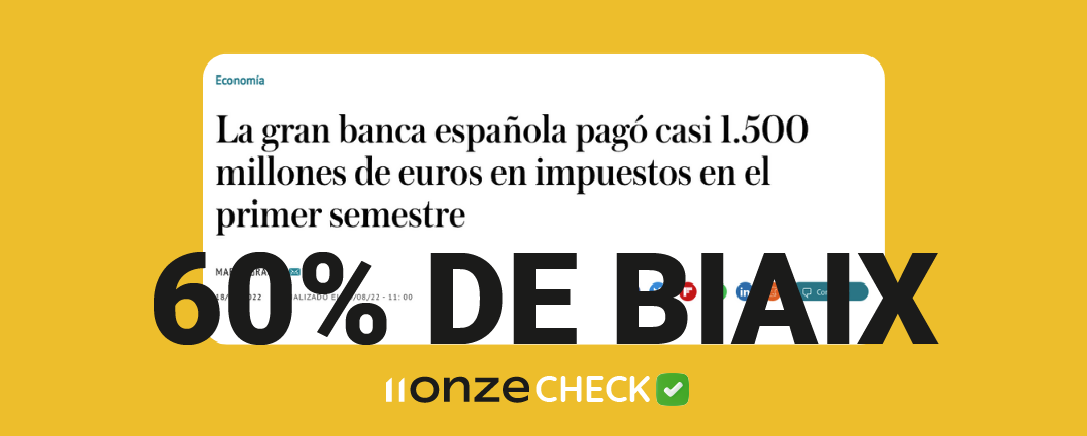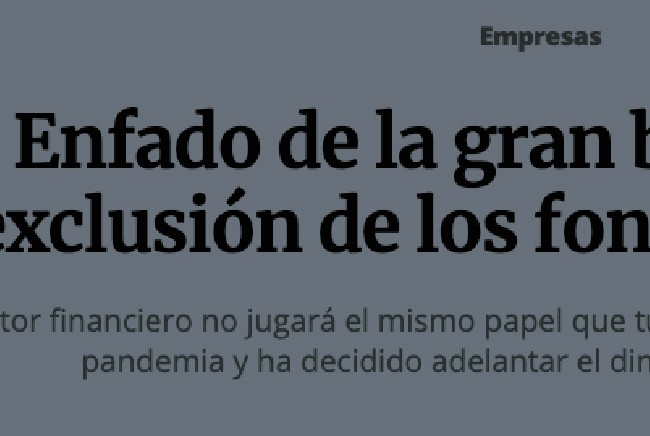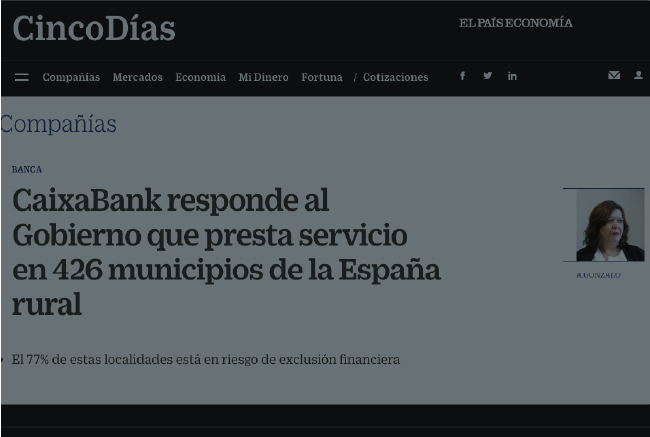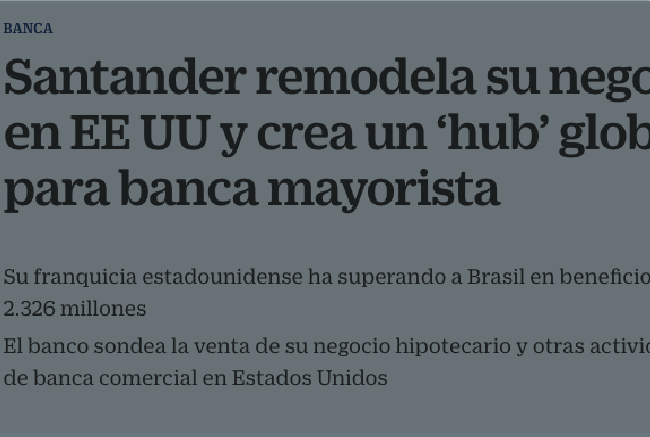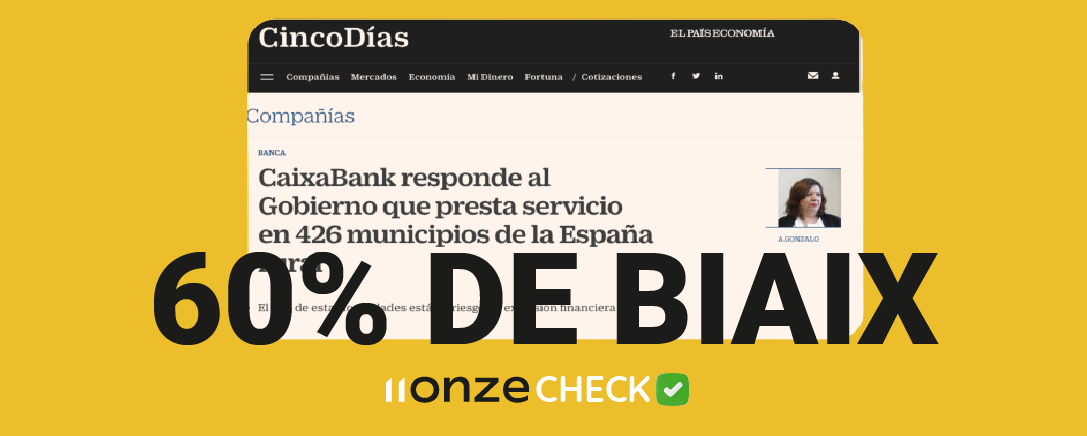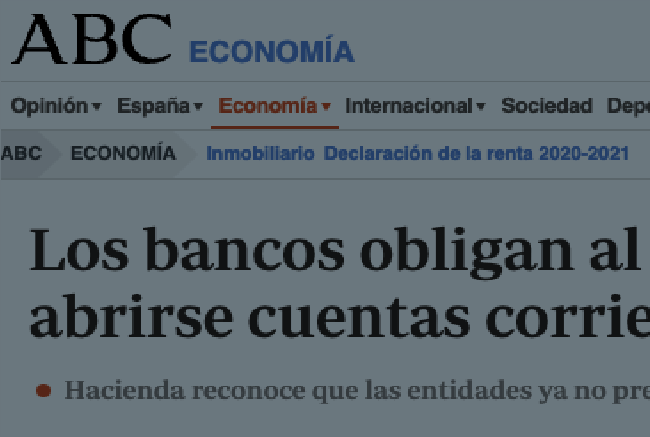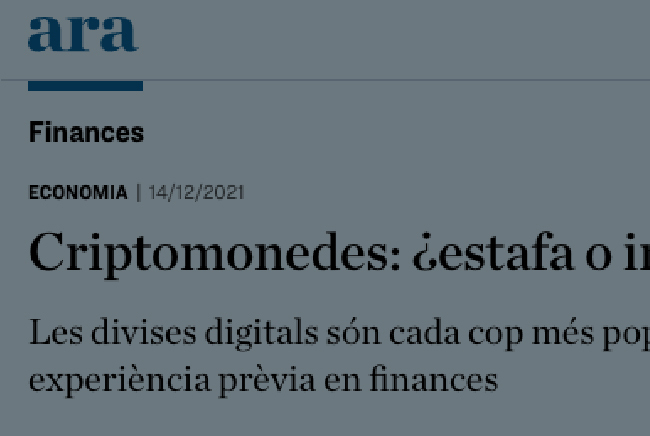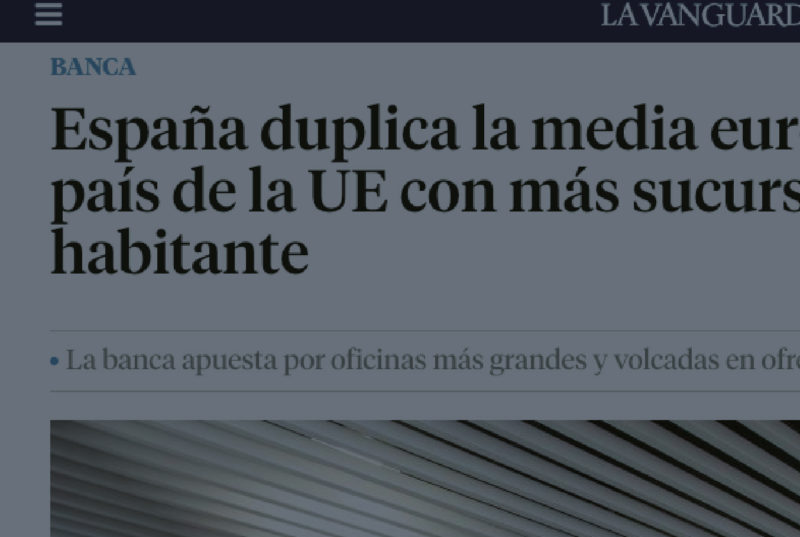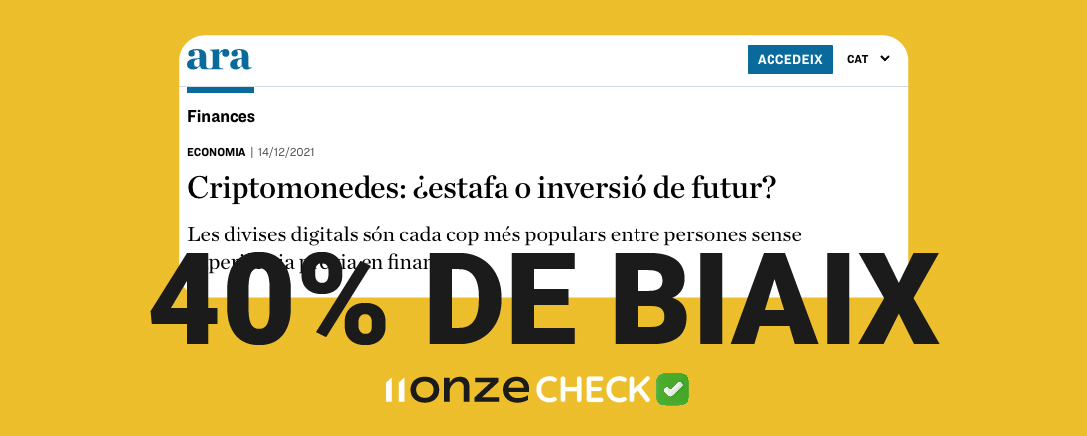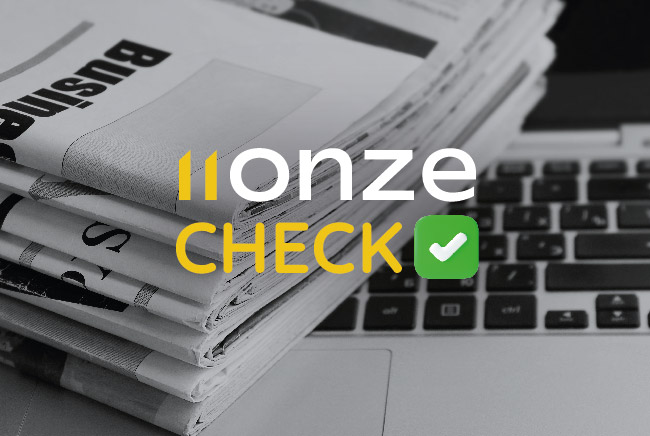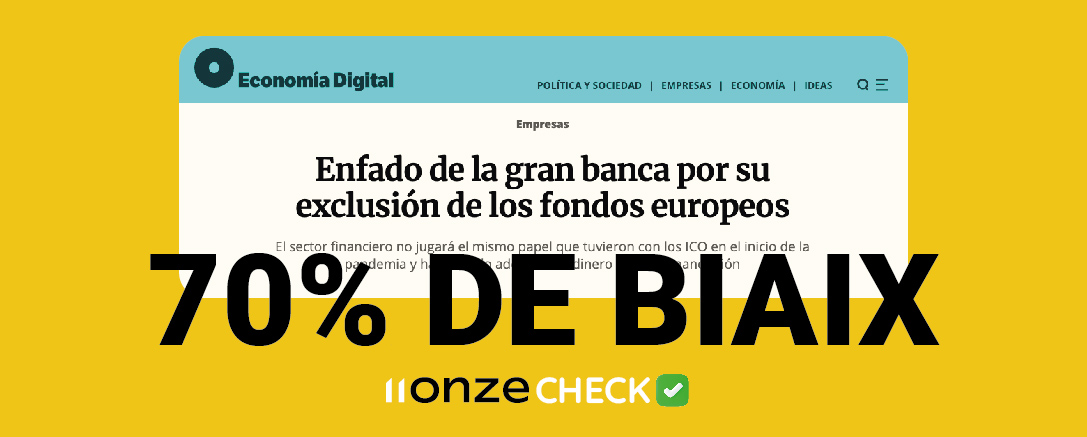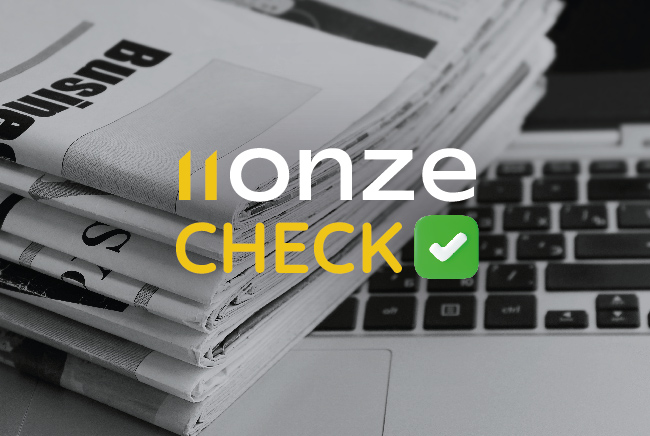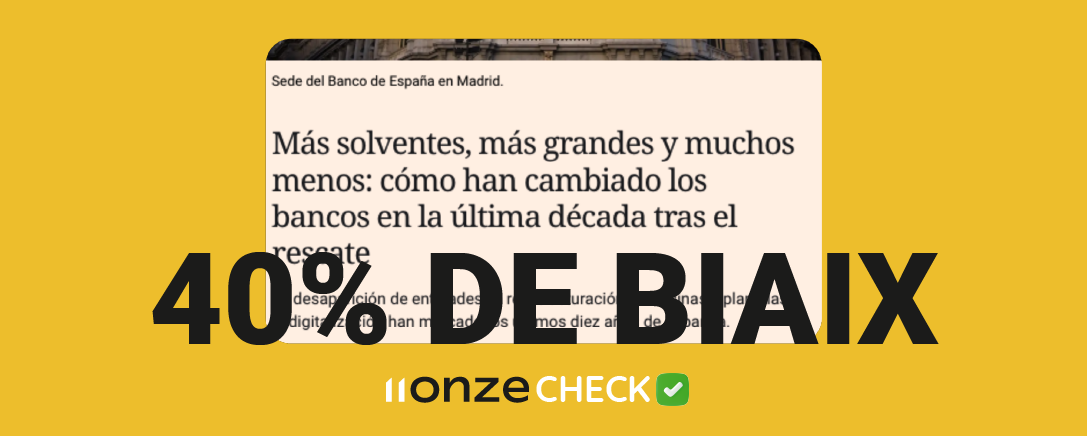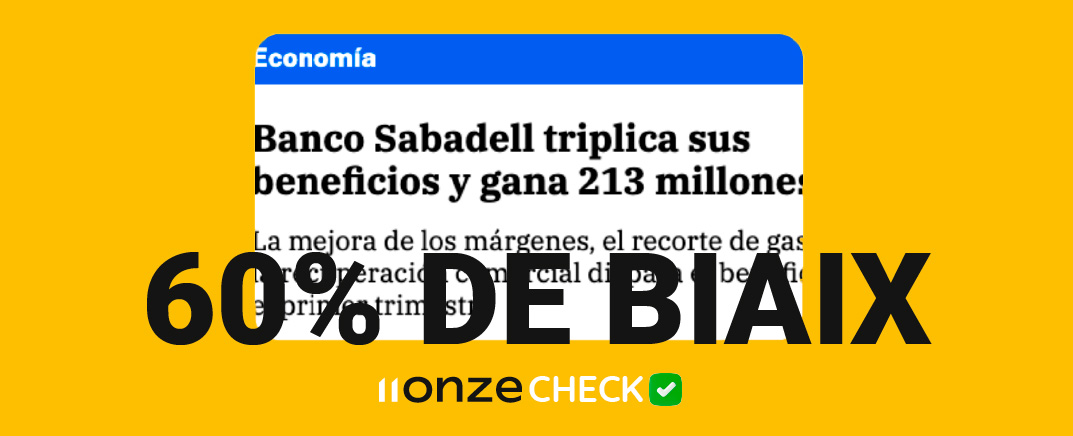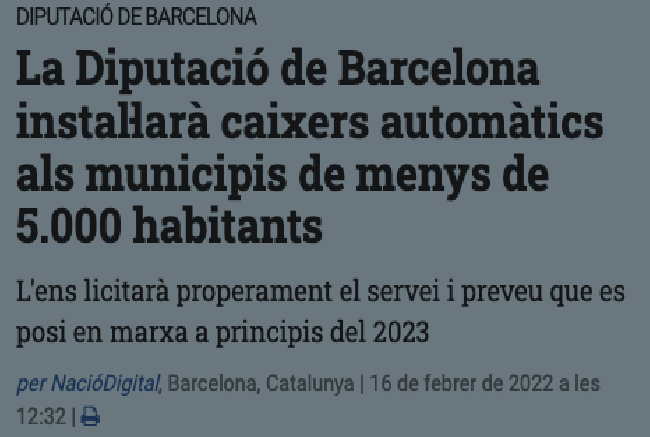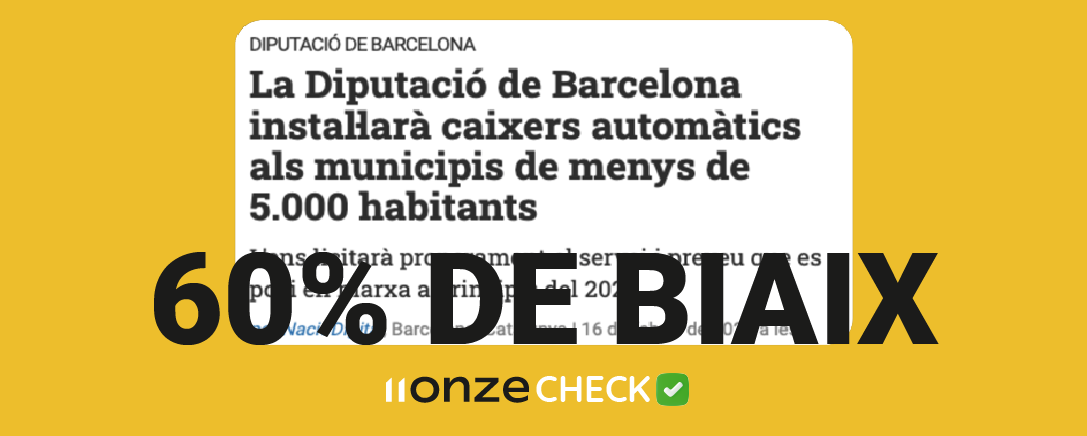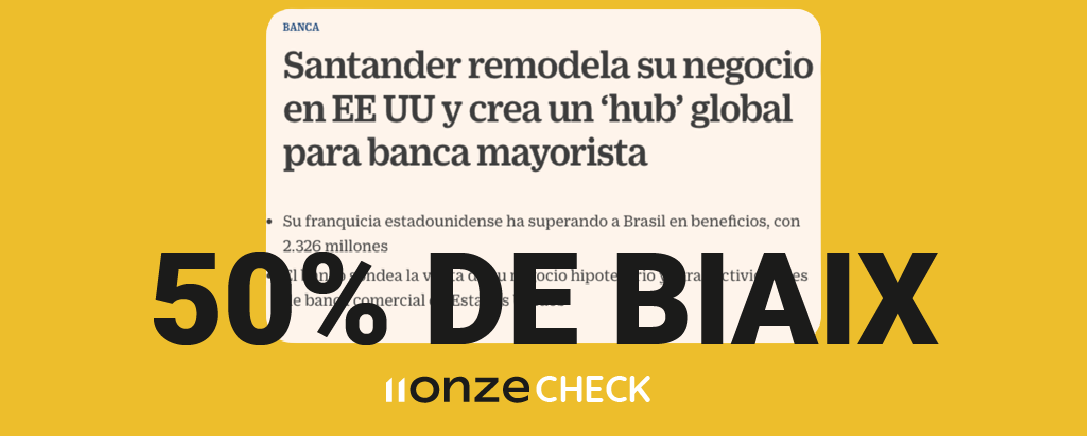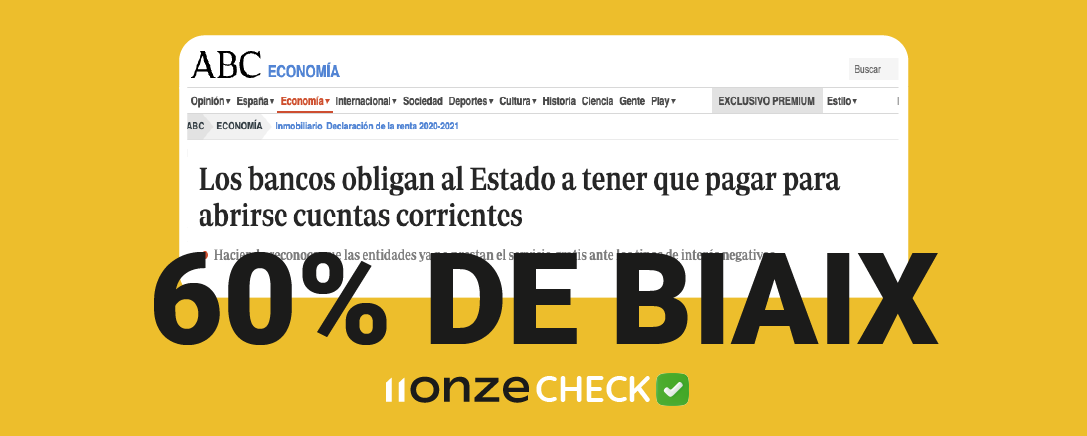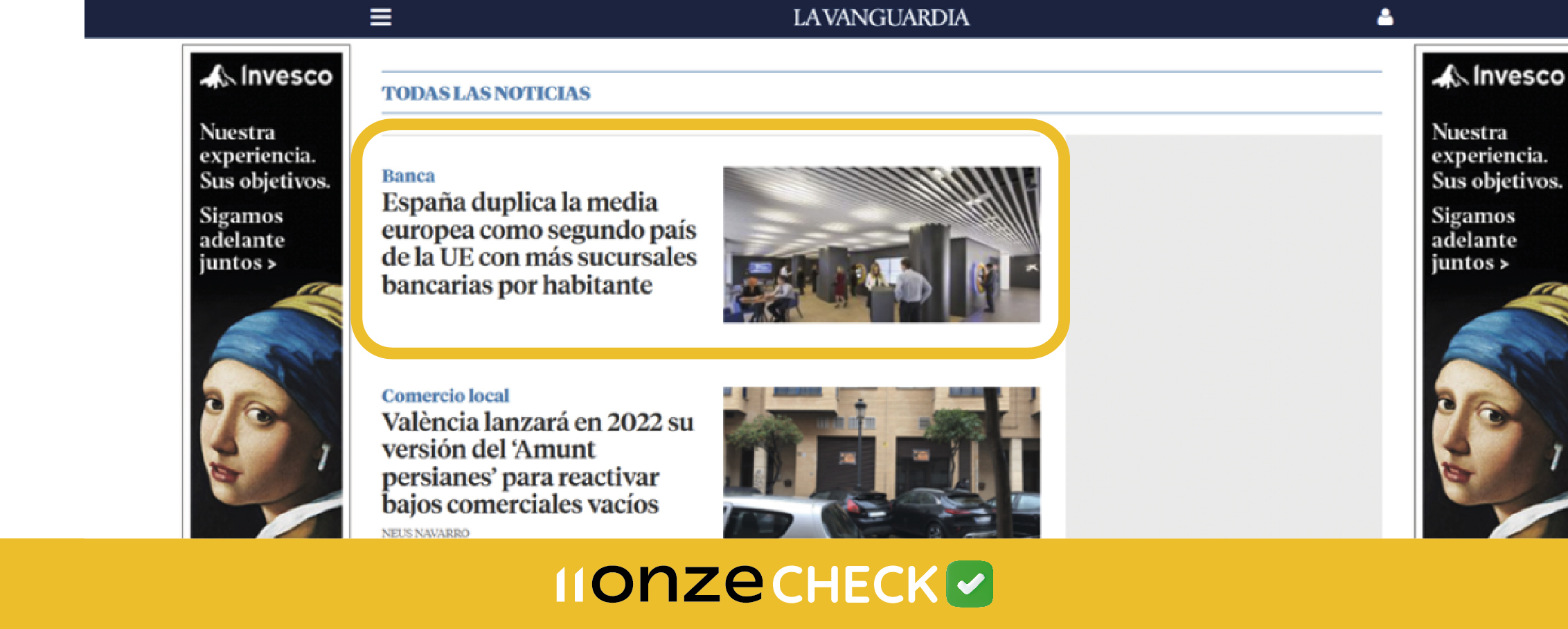11Onze Check: Kissing up to the one who pays?
The bill on the new banking tax, which aims to put a levy on the extraordinary profits of financial institutions, will be debated next week in the plenary session of Congress. Predictably, the banking sector has been up in arms and has even threatened to challenge in court a tax it considers unfair. The media echo the banking sector’s complaints, but do they show the same interest in explaining the other side of the coin? We focus on a news item from the digital newspaper ‘El Independiente‘ to contrast this information with the Bias Method.
The new extraordinary tax on large banks announced by the Spanish Prime Minister, Pedro Sánchez, will apply a 4.8% tax on their commissions and net interest for two years to banks that earn more than 800 million euros in the Spanish state.
The banking sector’s outright rejection of the new tax is nothing new. Since January 2018, when Pedro Sánchez, as secretary general of the PSOE and leader of the opposition, proposed that a surcharge would have to be imposed on bank profits to rescue part of the country’s pensions, the refusal of the big banks to accept a new tax has been widely covered by the country’s mainstream media.
Disseminating this information and echoing the banks’ complaints about any grievances that the sector considers relevant is perfectly legitimate and part of the media’s job. Even so, contrasting and contextualising information, as well as giving a voice to other actors who do not share the banking sector’s vision, is essential if the public interest, not just that of the banking sector, is to be represented by a press that presumes to be independent.
At 11Onze Check, we have focused on analysing the article published by the online newspaper “El Independiente” and have come to the conclusion that it is 60% biased. Even so, we could have chosen any of the many other articles published by most of the state media, with a very similar result.
SOURCES
Although the article includes a link from the same newspaper, echoing the prime minister’s announcement, it limits itself to giving a voice to the banks: CaixaBank, Banco Santander and Banco Sabadell without contrasting the information.
ENDOGAMY
There is no representative of the government, nor of parties in favour of this new law proposal, nor any alternative voice to the vision of traditional banking. We only read the opinion of “the representatives of each of the banks” who “have shown their disagreement with the government’s proposal, assuring that they already pay a lot of taxes”.
INTENTION
The headline “Large Spanish banks paid almost 1.5 billion euros in taxes in the first half of the year” is already a declaration of intent that is confirmed throughout the article. A story that focuses on the taxes paid by the big banks, but makes no mention of their large profits.
CONTEXT
The information is not contextualised beyond the announcement of the new tax by the Spanish government. It is not explained that this initiative stems from a recommendation by the International Monetary Fund (IMF), which, after the bank bailout, suggested that states establish taxes on banks so that the financial sector could make “a fair and substantial contribution” to compensate for the aid received. Nor is it mentioned that countries such as Germany, the UK and Australia have implemented similar taxes and mechanisms.
FOG
The reporting is foggy because far from being an informative article, it merely states that bankers are angry and repeats their statements without any counterpart or journalistic analysis to challenge this narrative.
VOCATION OF SERVICE
The unwillingness to serve the public interest is evident throughout the article, not only in what is said but also in what is not said. Bearing in mind that Spain is the European country where the banking crisis has been most costly for citizens, with 48 billion euros written off as lost and never to be returned to the people, it would be good for the article to explain that this is precisely why the Spanish banking sector is “always in the spotlight”.
To know more about the Bias Method we have used to compare this information, you will find it here. If you would like to send us economic information to verify, you can do so by writing to 11onzecheck@11onze.cat.
The First Vice-President and Minister of Economy, Nadia Calviño, has demanded a new plan from the banks to guarantee the financial inclusion of the elderly. The banks have promised to come up with new solutions within a month. But just four days after the requirement, CaixaBank has given a response to the State through various media outlets that provokes a certain ‘déjà vu’. We contrast it with the 11Onze Check Bias Method.
The report published by the Bank of Spain on 4 August 2021 warned that the consolidation of the financial sector, accompanied by the massive closure of bank branches and staff reductions, has left 1.3 million citizens vulnerable to financial exclusion.
In this context, it urged banks to find alternative solutions to ensure access to cash, especially in less densely populated areas. The study noted that, in some rural areas, mobile offices or financial agents have been operating for years in different municipalities to facilitate access to banking services.
Even so, it recommended using the network of post offices as complementary access points to branches and Cash Machines, to reach the level of countries such as Ireland, the United Kingdom, and Australia, which make widespread use of this solution. These recommendations urged the Asociación Española de Banca (AEB) and the Confederación Española de Cajas de Ahorros (CECA) to promote the Protocolo estratégico para reforzar el compromiso social y sostenible de la banca.
However, these measures have not been applied throughout the country, or have proved insufficient to alleviate the unease of a part of the population that feels scorned by the banks. A phenomenon that has gone viral with the declarations of Carlos San Juan, a 78-year-old pensioner, and his petition on Change.org for a more humane banking system. The protest has prompted the Spanish government to demand that banks take new measures to guarantee the financial inclusion of the elderly.
CaixaBank’s response has not been long in coming and several media outlets have echoed it. At 11Onze Check we have analysed how the specialised digital media have disseminated this information and, specifically, we focus on the article published by ‘Cinco Días‘. We have come to the conclusion that it has a 60% bias.
SOURCES
The article merely repeats the information found in CaixaBank’s press release. The figures published are presented without the source of the information, beyond the CaixaBank press release and the population data from the Instituto Nacional de Estadística (INE). This is a fact that is repeated in other articles published by various media and communication agencies, such as ‘El Economista‘, ‘Europa Press‘ and ‘Las Provincias‘.
ENDOGAMY
There is no alternative voice to the CaixaBank communiqué. At no point is there any reference to the government’s meetings with financial institutions and banking employers’ associations, where it was agreed that the Observatorio por la Inclusión Financiera should carry out a diagnosis of the situation in order to find new solutions to a banking response that has so far proved insufficient to guarantee financial inclusion for the whole of society.
INTENTION
The headline of the article tells us that CaixaBank responds to the Government, and the first paragraph specifies that this is in reference to the fact that the Government is urging the financial sector to guarantee financial inclusion. What is not explained is that this response from CaixaBank is practically identical to the response that the same financial institution published in August last year, and which was also echoed by ‘Cinco Días’, at the time, in an almost identical article, as if it were a case of recycling an out-of-date press release.
CONTEXT
The article leaves out a key element: that the government has demanded a 30-day plan for banks to detail how they will improve financial services for the elderly. Instead, it merely publishes a statement from CaixaBank that does not provide any new solutions. Nor is there any mention of people’s unease at the queues at banks and the lack of service, caused by the massive closure of bank branches, and the main reason for financial exclusion. Nor is there any mention is made of the record profits of the banks and, specifically, the profit of more than 5,3 billion euros that CaixaBank made in 2021.
FOG
The information is foggy because the article talks about the good work CaixaBank is doing in a news format, when in reality it is neither news, nor anything new, nor a good job, given the reaction of the population and the new demands of the state government.
VOCATION OF SERVICE
It is very clear that the article is not intended to serve the public interest, but rather to act as a megaphone for CaixaBank’s media response to a government request for more social commitment from banks.
To know more about the Bias Method we have used to compare this information, you will find it here. If you would like to send us economic information to verify, you can do so by writing to 11onzecheck@11onze.cat.
If you want to know more about superior options to make your money profitable, go to Guaranteed Funds. From 11Onze Recomana we propose you the best options in the market.
The success of the cryptocurrency phenomenon is forcing a paradigm shift in the international monetary world. The media highlight the risks of investing in cryptocurrencies, but show little interest in mentioning the advantages of these digital assets. At 11Onze Check we contrast this information by analysing an article in the ‘Diari ARA’ with the 11Onze Check Bias Method.
Cryptocurrencies are growing strongly and this, quite clearly, is not to everyone’s liking. They break the monopoly of money creation and are therefore a risk to the establishment. Historically, currencies have been used to impose some economies on others (we explained this in chapter 2 of El Diner). For example, we all know that the dollar is the world’s reserve currency and that this has allowed the United States to finance itself without much worry. Even so, the media tend to view them with suspicion.
One of the most obvious changes to the status quo, which is rarely mentioned in the media, is the fact that states and the financial institutions that serve them see their power of coercion against other states through economic sanctions, diluted. Mainly because cryptocurrencies do not depend on any central bank.
Likewise, the insecurity of cryptocurrencies is often emphasised due to their unregulated, anonymous, and for some, speculative nature. But typically it is not explained that blockchain technology makes them safer than physical currencies and highly immune to crises such as that of 2001 in Argentina, precisely because it eliminates the need for a state or banking intermediary, and allows for the democratisation of monetary policy.
The Diari ARA publication focuses on cryptocurrencies and asks whether they are a scam or an investment for the future. The title indicates the possible bias of the article, but we analyse it and explain why we conclude that it is 40% biased.
EMOTIONS
The text generates fear of cryptocurrencies. Expressions such as ‘scam’, ‘fever’, ‘pyramid scheme’, ‘tax haven in the dark’ are recurrently used. There are no positive examples. Is the reader being conditioned?
The first two paragraphs (the most read of any news item) are clearly negative, without compensation. The title and subtitle are already a statement of intent that the newspaper considers acceptable. But to see that this is not the case, you only have to change the actors. Can you imagine a headline like this: “IMF and World Bank, mafia or credit institutions?
CONTEXT
There is no mention of the decentralisation of money creation. That is to say: the authoritative quotes from Nobel Prize winners in Economics and Central Bank directors are disallowed if we realise that cryptocurrencies are, precisely, a threat to those who have always held economic power. The democratisation of currency creation would put an end to the banking monopoly. It is expected that the heads of Central Banks do not like it, but can we trust them?
Nor do they talk about the security of cryptocurrencies. The fact that they are based on blockchain makes them safer than many physical currencies at times when there is a debt overhang that probably cannot be supported by a central currency. There is no explanation, therefore, that perhaps real money is not worth what we think it is worth.
METHODOLOGY
The article relies on authoritative quotes, but we do not know on what basis they make these opinions which, as it turns out, could not be based on facts. We are also not linked to the original statements, so we cannot verify them.
INTENTION
Taking a look at the Diari ARA it is easy to find advertisements from traditional banks, which are the main interested parties in making sure cryptocurrencies are not a success. Can the ARA have some hidden interest in generating distrust towards cryptocurrencies?
No company or product can ignore the influence that the media has on its popularity, both good and bad news can have a significant effect on its value and public perception, especially when it comes to investment crypto assets such as cryptocurrencies.
Beyond the sensational headlines caused by large rises or falls in the value of some cryptocurrencies, and the rapid growth of the cryptocurrency sector, especially Bitcoin, we cannot forget that cryptocurrencies, unlike traditional currencies, are not regulated by any central authority, and this makes them especially sensitive to popular perception often influenced by the media.
While it is perfectly reasonable to explain the risk associated with investing our money in cryptocurrencies, it would also be logical to point out the economic advantages not only on an individual level, such as reduced fees, but also generally speaking.
The global character and above all the decentralised nature of cryptocurrencies, free from the influence and regulation of central banks and therefore with limited interference from public authorities, shakes the financial monopoly of states and global financial institutions such as the IMF and the World Bank, which are opposed to cryptocurrencies as long as they are not cryptocurrencies under their control.
If you want to know the Bias Method, which we have used to contrast this information, you will find it here. If you want to send us economic information to verify, you can do so by writing to us at: 11onzecheck@11onze.cat
11Onze is the community fintech of Catalonia. Open an account by downloading the super app El Canut for Android or iOS and join the revolution!
On 21 of June 2020, the European Council approved an economic stimulus package known as the European recovery fund or Next Generation EU (NGEU), with the aim of reviving the economies of member states affected by the Covid-19 pandemic. Banks are complaining that they will not play the same role as they did with the ICO during the pandemic, but are their complaints sufficiently substantiated? We cross-checked the information.
Six months ago, the Spanish government and the banks initiated formal contacts to explore ways of collaboration and to specify the role that financial institutions will play in the distribution of the European fund. Negotiations are still ongoing, but it is becoming clear that the role of the banks in channelling this fund will be different from the one they developed with the ICO credits during the pandemic, since in this case, the state has the money at its disposal. The ICO is a public bank with the function of distributing credit to stimulate the economy and depends on funds provided by the Spanish government. During the pandemic it had no liquidity, and it was the private banks that provided the money for the ICO loans, making it a business for the sector. Now, it seems that the Spanish government does not need private banks because it has the 140 billion coming directly from Europe.
The banks’ outcry did not take long, and it seems that they have all agreed to publicise their grievances. An extensive media offensive that we analyse today by looking at an article published by Economía Digital, “Enfado de la gran banca por su exclusión de los fondos europeos”, but which serves as an example of how other media has dealt with the issue. Is this information biased? Yes, according to the 11Onze Check Bias Method, it has a bias of 70%. We analysed it.
SOURCES
We only hear the voice of the banks. There is only one unidentified source from the Spanish government. There is no reference for all the data provided. It is not possible to trace where this data comes from.
ENDOGAMY
There is no representative of the ICO, nor of the Ministry of Economy, nor any alternative voice to the view of the traditional banks. We only read the opinion of the banks’ representatives. Moreover, unverified statements from the banks are taken for granted. For example: “The president of Banco Santander, Ana Botín, recalled this week that banks have played an important role in the pandemic by protecting businesses, and now they need to strengthen public-private collaboration to do the same with the recovery funds”. If we know that, according to the INE, in nine months of the pandemic 207,000 businesses closed… Are we sure that, as Botín says, the banks have protected companies?
FOG
The information is foggy because the bankers seem angry, but, at the same time, they assure that the arrival of the funds will increase their turnover by 10%. The mechanisms that the banks are proposing to participate in the Next Generation Fund are also unclear and seem to be focused on accompanying the client. In reality, however, it could be a manoeuvre to make sure the public funds go to their clients’ accounts (and not to other entities) in order to be able to count on these funds.
INTENTION
We are not talking about a single news item but about a compilation of articles in the same media outlet, some of them linked to each other, which contain the same rhetoric clearly aimed at discrediting the government’s management and spreading the bank’s vision: 1, 2, 3. Therefore, we can deduce that there is an intention to establish the narrative according to which the banks have to participate, no matter what, in the allocation of public funds.
CONTEXT
The information is simplified, and key elements are missing. For example, it is not explained that the ICO’s function is specifically to provide credit to stimulate the economy. It seems that it cannot function without private banks, and this is not true. Nor is it explained how this aid has been channelled in other countries. And finally, there is a crucial piece of context that is omitted: banking has already recovered pre-pandemic profit levels thanks to the closure of branches and massive lay-offs. Nine billion net since the start of the pandemic. This, coupled with the fact that the price of money is at historic lows, removes any impediment for banks to lend and stimulate the economy. What is stopping them? What do they need Next Generation Funds for?
COMMERCIAL MOTIVES
The article talks about the good role played by banks in channelling the ICO funds and the role they can play in the Next Generation fund, but makes no mention of the benefits obtained by the financial sector through the management of the ICO, nor of the abusive practices that were uncovered during its management. Nor is there any mention of the commercial interests behind this desire to play a key role in the distribution of these new resources. The basic idea is to play the role of intermediary. The money comes from Europe (and therefore does not have to be mobilised by the banks), but it is still channelled through private banks. Why should it be this way? What is the point?
VOLUNTEER SERVICE
The public interest is not represented at all. While it talks extensively about how private banks and investment funds are key in advising companies and distributing this fund, no public alternatives, which are there, are given when it comes to channelling this aid. The article does not take into account the consumer’s point of view: is it in the interest of the ordinary citizen that ICO loans are managed by large Spanish private banks?
Therefore, we conclude that this information is 70% biased and shows a partial view of the management of the Next Generation Funds. If you want to know the Bias Method, which we have followed to contrast this information, you will find it here. If you would like to send us economic information to verify, you can do so by writing to us at 11onzecheck@11onze.cat
11Onze is the community fintech of Catalonia. Open an account by downloading the super app El Canut for Android or iOS and join the revolution!
A decade after the Spanish bank bailout, hopes of recovering the billions that were injected into the banks are fading. Only around 6 billion of the 62.754 billion injected by the Spanish state into a financial sector that has been drastically transformed has been recovered. The article published by “El Español” takes stock of the changes that have taken place in the banking sector, and from 11Onze Check we analyse the news with the Bias Method.
The serious liquidity problems and the insolvency of the banks made the structuring of the Spanish banking sector inevitable, but by then Spain was already paying unsustainable risk premiums. Thus, on 19 June 2012, the Spanish government asked, or was forced to ask by its European partners, for a credit line from the European Union (EU) of 100 billion euros.
Ultimately, the money used by a tailor-made bailout for the banks was 41.333 billion euros, preventing the collapse of the Spanish financial system. So far, the state, or rather the Spanish taxpayer, has repaid 17.612 billion euros to the Stability Mechanism (ESM), with the rest of the requested loan and interest due to being repaid by 2025.
Public money at a loss
However, despite obtaining record profits, Spanish banks have been more than reluctant to return the money from a public bailout that finally amounted to 62.754 billion euros, of which only around 6 billion euros have been recovered through redemptions and sales of institutions. Money that belongs to the public, who have paid their taxes.
The social cost of this bailout to a banking system that continues to evict thousands of people a year, that does not forgive a delay in the payment of a monthly mortgage, that has closed thousands of cashpoints and bank branches encouraging the financial exclusion of a large part of the population, is just one of the consequences of a bailout that was tailor-made for the banks, and at the expense of the population that has ended up paying the price.
It is for these reasons that it is surprising that the article published by “El Español” tells us that everything possible has been done to avoid the loss of public money, that the social function of the banks has not been lost, and that it presents the banks spearheading the solution to the economic crisis we are suffering, especially when Spain will have to be rescued again by Europe. At 11Onze Check we take all these factors into account and conclude that this article has a 40% bias.
INTENT
We can deduce that there is an intention to establish the narrative according to which private banks have to participate in public funds but can be exempted when these same public funds are not returned, given their indispensability for the economic stability of the country. Comments such as “the banks, this time, have not been the problem, but the solution”, ignore the fact that precisely with the aid for the sanitary crisis, the banks have not even been necessary to act as intermediaries in the funds that have come from Europe.
CONTEXT
Although the information is contextualised with a preview of the bank bailout and the money still to be returned, it is hard to understand how the banks can be presented as the solution to our financial problems when there are more than 50,000 million that they have not returned and that will probably never return to the public coffers.
FOG
The article is foggy because some information presented is not supported by any evidence. For example, when it says that the bank’s social work has been maintained, without taking into account that investment in social work has fallen by 60% in recent years and the number of beneficiaries by 75%. In other words, the social and cultural work of the former savings banks has not been rescued.
VOCATION OF SERVICE
It normalises a situation that is clearly contrary to the public interest as a fait accompli that we have to accept and move on from. There is no mention of alternative scenarios existing in other countries around us, where banks have indeed returned a large part of the bailout money. Nor is there any mention of how a public bank could be an alternative to the current system, which has shown itself to be totally inadequate to look after the financial interests of the population, especially given the ethical incongruity of financial institutions with record profits not returning public money that has been used to bail them out.
If you want to discover the best option to protect your savings, enter Preciosos 11Onze. We will help you buy at the best price the safe-haven asset par excellence: physical gold.
Since the failed attempt at a merger between Banco Sabadell and BBVA, which was intended to cut costs to cope with the stock market crash of recent years, the two banks have been competing to justify their decision to go it alone with a story that sounds like something out of a fairytale. A perfectly legitimate marketing strategy, but one that in no way justifies the media repeating the same propaganda without any kind of filter. We analyse the news published by ‘La Razón’ using the Bias Method.
The sale of BBVA’s subsidiary in the United States provided the bank with 9.6 billion in capital. This infusion of liquidity, at a time of low market capitalisation performance during which it was very difficult to increase capital, revived the possibility of a merger between the two entities, which has finally been postponed indefinitely.
Nevertheless, the trend towards a banking consolidation in the form of an oligopoly, or even duopoly, on the part of traditional Spanish banks seems inevitable. The bursting of the real estate bubble in 2008 spearheaded a chain of crises, mainly caused by the deregulation of the financial system, which have been hitting the systemic banks, and which have ended up being paid for by the taxpayer, who, on the other hand, is also the most damaged party in this process of consolidation.
Likewise, new technologies have made possible the strong entry of fintechs into the financial world, until now dominated by traditional banks, further eroding their market share, especially by the new generations. The result is that these entities are subject to suffocating pressure on prices, both in terms of loans and payment platforms, as well as in terms of deposit-taking. A scenario that, together with the flight of customers tired of abusive commissions, can be compensated in the short term with staff cuts and the massive closure of branches and cashpoints.
In this context, and in view of the need to reassure investors, the declarations of César González Bueno, CEO of Banco Sabadell, are understandable, assuring that the good evolution of the entity justifies the decision to go it alone. Even so, the data are not always positive, with falls in mortgage production compared to the first quarter of 2021 and in fees for card use, as well as a drop in market share, which has lost up to 14 basis points.
At 11Onze Check we take all these factors into account when analysing how the article in ‘La Razón’ presents the information on Banco Sabadell’s positive results, and we conclude that it is 60% biased.
SOURCES
The article limits itself to publishing the information given by Banco Sabadell, supposedly in the press release. Even so, the published figures are presented without the source of information and without any reference. The statements of César González Bueno, CEO, and Leopoldo Alvear, CFO, are also published, so we only hear the view of the banks.
ENDOGAMY
There is no alternative voice to Banco Sabadell’s official statement. Moreover, the bank’s statements are taken for granted without checking the data, which is not always good. Nor is any kind of context offered in regard to the bank’s problems in improving profitability, despite the fact that it is the bank that has laid off the most people in proportion to its workforce.
INTENT
While the article is clearly a commercial disguised as news that has been repeated in other bank-friendly media, it is worth questioning the motives behind the need for this positive news. Is it an attempt to calm investors worried about massive account closures or low profitability? Are they trying to cover up Banco Sabadell’s fragility?
COMMERCIAL MOTIVES
Banco Sabadell’s links with Grupo Planeta, owner of ‘La Razón’, are no secret. There is, therefore, a clear conflict of interests that would explain why the newspaper seems to be part of a media campaign by Banco Sabadell with the intention of giving a positive image of the bank.
FOG
The information is foggy because the article talks about the good results of Banco Sabadell’s commercial management in a news format, when in fact it is neither news nor such good management when the official data are analysed.
VOCATION OF SERVICE
There is no doubt that the article is not intended to serve the public interest, but to act as a megaphone for the bank’s narrative and, therefore, to serve its interests.
If you want to know more about the Bias Method we have used to check this information, you will find it here. If you want to send us financial information to verify, you can do so by writing to 11onzecheck@11onze.cat.
If you want to know more about superior options to make your money profitable, go to Guaranteed Funds. From 11Onze Recomana we propose you the best options in the market.
The Diputació de Barcelona has announced that, in order to stop the financial exclusion of rural areas caused by the massive closure of bank branches, it will issue a tender to banks to install cashpoints in municipalities with less than 5,000 inhabitants. At 11Onze Check we analyse the news published by ‘Nació Digital’ with the Bias Method, and we ask ourselves if it is ethical to pay with public money a tender that will give even more profits to the banks to replace the cashpoints they have eliminated.
The inexorable closure of bank branches by Spanish banks is shaping a new scenario where cashpoints are in a process of extinction. Urban centres, but especially rural areas, watch helplessly as the closure of branches and the loss of banking services continues unabated. This dwindling density of the banking network is aggravating the financial exclusion of a large part of the population, especially the elderly, who feel stigmatised and despised by the traditional banks.
Complaints from users prompted the Bank of Spain and the state government to urge banks to find alternative solutions to guarantee access to cash, but these have proved insufficient. Even so, the affected municipalities are doing what they can. Some have decided to go head-on and hit the banks in their pocket. In El Vendrell, the council will raise taxes on banks that do not provide customer service to the elderly in person.
The town council of Móra la Nova has decided not to contract any more services with BBVA, in response to the bank’s reduction in services to its customers. “It is unacceptable that banks are increasingly neglecting those affected by the digital divide. Our older citizens deserve to be properly attended to, not abandoned,” emphasised the mayor of Móra la Nova, Francisco X. Moliné.
On the other hand, the Generalitat del País Valencià and the Diputació de Barcelona will act on their own by investing public money to install cashpoints in depopulated areas. These tenders, at the expense of the town councils, will increase the millionaire profits of the same banks responsible for the unsustainable lack of branches.
At 11Onze Check we take all these factors into account when analysing how the article in ‘Nació Digital‘ explains the reasoning behind the Diputació de Barcelona’s tender, and we explain why we determine that it is 60% biased.
SOURCES
In the article, we find a series of statements by Josep Arimany of the Diputació de Barcelona. The news item merely repeats statements found in the Diputació’s press releases, but the voices of other actors involved in the process are missing. There is no statement from the mayors of the municipalities that will subsidise part of the cost of this tender, nor is there any statement from the representatives of the banks or neighbourhood associations.
CONTEXT
The article leaves out key elements that would help the reader understand why this situation has come about. For example, there is no mention of the report that the Bank of Spain published on 4 August 2021, where it urged banks to take alternative measures to guarantee access to cash. Nor does it explain how these solutions have not been applied throughout the territory and have proved insufficient, urging the state government to demand a new plan from the banks to guarantee financial inclusion.
FOG
The information is foggy because it normalises a bidding process at the taxpayer’s expense that is anything but normal. Councils that assume an extra cost that should not correspond to them, especially if we take into account the profits of the banks and their role in creating the problem that the Diputació de Barcelona wants to solve with these measures.
ENDOGAMY
The article presents the position of the Diputació de Barcelona without questioning its action plan or possible alternatives. Nor is there any reference to the composition of the political representation in the Plenary of the Diputació and the conflict of interests between these political parties and the banks, which could explain why it is taken as a fait accompli that the city councils have to take charge of subsidising the banks.
INTENT
No mention is made of users’ complaints with the signature campaign, nor is there any mention of the banks’ record profits. The article limits itself to repeating the statements by MP Josep Arimany assuring that “the Diputació will be ‘rigid’ with the conditions it will demand from the banks to win the tender”, without specifying the conditions. On the contrary, it gives the impression that the aim is to justify the unjustifiable, but without providing any argument that would lend credibility to a tendering process that, a priori, seems biased in favour of the banks.
VOCATION OF SERVICE
The willingness to serve the public interest is called into question when the article simply describes a bidding process and states that the viability of the project is only possible if the Diputació and the town councils assume the cost of the project, without even questioning the possibility of sharing the cost with the banks.
To know more about the Bias Method that we have used to check this information, you can find it here. If you would like to send us economic information to verify, you can do so by writing to us at 11onzecheck@11onze.cat.
If you want to know more about superior options to make your money profitable, go to Guaranteed Funds. From 11Onze Recomana we propose you the best options in the market.
A few days ago, the Supreme Court dismissed the appeal and confirmed the fine of 485,000 euros to Banco Santander for a serious breach of the Code of Best Practices. Even so, this fact was not newsworthy for the main Spanish newspaper, ‘El País’, which, instead of talking about it, has published positive news about the financial institution. We analyse it with the Bias Method.
A day after Banco Santander presented its results for the 2021 financial year, with profits of more than 8,000 million euros, the Supreme Court announced that the bank will have to pay 485,000 euros for not restructuring mortgages for people without resources. This was confirmed by the contentious chamber of the Supreme Court, which rejected the appeal filed by the bank against the National High Court in a ruling on 11 January.
Specifically, the Bank of Spain imposed the aforementioned sanction for a serious breach of the Code of Best Practices (CBP) of the Royal Decree on urgent measures for the protection of mortgage debtors without resources. This fine was imposed on the institution following an inspection – carried out between 1 January and 31 December 2014 – to check that the mortgage debt restructuring measures were being applied, as provided for in article 5.4 of the Royal Decree.
Although the sanction is clearly symbolic, given the financial institution’s profits, it does show that the bank did not apply the measures in force to protect vulnerable families, a fact that is certainly of interest to the public. It is therefore surprising that the same week that several media outlets publish the news of the fine, ‘El País’ not only fails to publish it, but devotes a whole series of articles to praise Banco Santander.
Is it possible that the leading Spanish newspaper is compensating for the bad public image of one of its shareholders by trying to hide the bad news with praise? We have analysed with the Bias Method one of the first news items that the newspaper published after the ruling was confirmed, and we have come to the conclusion that the information is 50% biased.
SOURCES
The article limits itself to publishing the information supposedly provided by Banco Santander. The published figures are presented without the source of the information. Obviously, the reader can look for the information on his own, but the journalist should facilitate this task and provide the original sources.
ENDOGAMY
There is no external evidence, nor any alternative voice to the official Santander version. This is an article in the format of promotional content, where the bank’s president sets the editorial line, the bank provides the data and the editor simply puts it in news format.
INTENTION
Although the news of the week for the public at large is the dismissal of a cassation appeal filed by Banco Santander, with the subsequent confirmation that it will have to pay a fine of 485,000 euros for malpractice, ‘El País’ does not echo it. On the other hand, it does publish a series of articles with headlines such as: “Santander earns 8,124 million in 2021, the highest profit in the last decade”, “Santander takes to the market and issues 1,350 million in debt”, “Botín breaks away from its rivals in the dividend war”… One might think that the newspaper is doing its best to ensure that the publication of a string of good news hides the bad news of the week.
COMMERCIAL MOTIVES
It is no news that a large part of the newspaper’s advertising revenue comes from private banks, specifically Banco Santander, which is also a shareholder of Grupo Prisa, to which the newspaper belongs. There is, therefore, a possible conflict of interest that would explain why the newspaper seems to be part of a media campaign by Santander to give a positive image of the bank in view of the Supreme Court ruling confirming that it has abused its customers.
VOCATION OF SERVICE
It is quite evident that the article analysed and the rest of the articles published by this same media outlet do not serve the public interest, nor do they have as a priority the will to serve public opinion. On the contrary, they are entirely focused on whitening Santander’s image at a time of need. They, therefore, contravene the most basic rules of the journalists’ code of ethics. The aim is not to give the news, but to divert readers’ thoughts away from the facts, which are really newsworthy, that are damaging to Santander.
To know more about the Bias Method we have used to compare this information, you will find it here. If you would like to send us economic information to verify, you can do so by writing to 11onzecheck@11onze.cat.
11Onze is the fintech community of Catalonia. Open an account by downloading the super app El Canut on Android and Apple and join the revolution!
The monetary policies of the European Central Bank maintain negative interest rates that penalise savings in order to reactivate consumption. This has led to banks not offering a good return on deposits and even charging us for the money deposited. A phenomenon that has spread to the current accounts of state administrations, by banks that have been bailed out with public money. Do they have the right to impose deposit commissions on public administrations? We focus on a news item from ‘ABC‘ to contrast this information with the Bias Method.
Since 2014, when the European Central Bank (ECB) established that private banks would have to pay a charge of 0.40% to keep money, the charging of commissions for deposits by banks focused, at first, on individuals and businesses, but has also reached the institutional client.
This situation penalises the profitability of taxpayers’ money and has created a tug-of-war between private banks and the public administration. The conflict became evident in the last public tender to manage the current account of the Fondo de Reestructuración Ordenada Bancaria (FROB), which in the first instance was left empty because the FROB had established that the winning bank could not charge interest on its accounts and deposits.
The lack of competition is obvious, especially after the banking consolidation that generated an oligopoly controlling 60% of the financial market. Likewise, parts of the State Administration, such as the Congress and the Senate, have transferred the treasury of their deposits to the Bank of Spain in order to avoid private banking commissions.
A concentration of financial power that, even so, has removed any possibility of turning the bank bailout debacle into a social investment after the takeover of Bankia by CaixaBank, and the subsequent disappearance of 61% of Bankia’s public shareholding, and 21 billion of the bailout that has still not been repaid. A democratic anomaly that highlights the lack of public banks in Spain, as we do find in other countries such as Germany, France, Italy, and Switzerland, which can alleviate this situation, or at least offer a more competitive alternative to private banking.
At 11Onze Check we take all these factors into account when analysing how the article in ‘ABC’ explains the reasons why banks force the State to pay fees for their deposits, until recently unheard of, and we conclude that it is 60% biased.
INTENT
The subtitle of the article states that “The Treasury recognises that banks are no longer providing the service for free in the face of negative interest rates”, a message that is reinforced throughout the article. This may lead us to think that, in the past, banks offered this service free of charge, as if it were an altruistic service. But is this really the case? This ‘free’ service was generally conditional on contracting other products or services from the financial institution, such as payroll management or payments to suppliers. And we cannot forget that deposits are an asset of the bank.
CONTEXT
The information leaves out key elements from the article, such as the fact that CaixaBank, the bank awarded the contract to manage the ministry’s current accounts, is one of the financial institutions bailed out with public money, and has not yet repaid this money.
There is no contextualisation of the malaise of the big banks with the state government in relation to the Next Generation funds, due to the fact that they cannot act as intermediaries and charge commissions. On the contrary, it simply repeats the banking narrative, the narrative of fear: “[…] Money from Europe is being lost because of slow execution. The funds are not flowing as expected into the real economy – it is also being felt in economic growth”.
Nor is another key piece of information given: that of record banking profits. Specifically, CaixaBank had a profit of more than 5,300 million euros in 2021. What is the urgency of having to charge the government for deposits?
ENDOGAMY
The article limits itself to giving the view of traditional banking through statements from “financial sources”, without specifying, when it talks about European funds, but at no time does it explain the version of the Ministerio de Economía y Empresa or other official bodies such as the Instituto de Crédito Oficial (ICO).
FOG
The information is foggy because it does not present alternatives to private banking, and would have us believe that the banks had done us a favour with their selfless altruism, until they had no alternative but to charge fees to the state for a reason totally unrelated to them, such as the ECB’s monetary policies. It does not explain that there are other options.
Moreover, the news item is imprecise because it does not detail amounts. Which are the entities charging the administrations? For what? How is it calculated? Providing specific data could make these rescued financial institutions blush.
COMMERCIAL MOTIVES
It is no secret that a large part of ‘ABC’s’ advertising revenue comes from private banking. Moreover, the Vocento group, to which the newspaper belongs, is owned by Santander Asset Management, a Banco Santander company. Does this create a conflict of interest whereby the newspaper is forced to disseminate a type of narrative that follows the same line as that of the banks, while ‘forgetting’ to explain the counterpart that could challenge this narrative?
VOCATION OF SERVICE
A situation that is clearly contrary to the public interest is accepted and normalised as a fait accompli. There is no mention of existing alternatives in other countries around us, such as public banks. Nor is there any explanation of the ethical incongruity of a financial institution that has been bailed out with public money charging commissions to a public administration when it has still not repaid 21 billion euros of this bailout. Therefore, the news does not seem to serve the interests of the public, but rather that of the banks.
To learn more about the Bias Method that we have followed to contrast this information, you can find it here. If you would like to send us economic information to verify, you can do so by writing to 11onzecheck@11onze.cat.
11Onze is the fintech community of Catalonia. Open an account by downloading the super app El Canut on Android and Apple and join the revolution!
The draconian closure of bank branches by Spanish banks has no end. The bank-friendly media, because they accept their advertising, justify it by explaining that the density of bank branches in Spain is well above the European average. But is this the only data we need to look at, or are there more factors to take into account? We analyse a news item from ‘La Vanguardia’ using the Bias Method.
Since 2007, more than half of the bank branches in Spain have been closed, a fact that aggravates the exclusion of rural areas and the elderly. The limited opening hours cause long queues in the morning to carry out basic formalities. Local councils are trying to find solutions with financial institutions. There is talk of alternatives, such as opening more ATMs in local shops, supermarkets, or shopping centres, and formulas to stop the degradation of closed branches and thus avoid disasters such as the one in the Plaza de Tetuán (Barcelona).
In addition to the massive closure of branches, there are record numbers of employee redundancies. Banks will close the year having dismissed 19,000 staff, at a cost of 4.8 billion euros. A figure that places Spanish banks well above the European average of customer-employee ratio, a fact that makes personalised customer service even more difficult, just when a new law is about to come into force that obliges banks to provide 24-hour customer service, and without the use of telephone robots.
At 11Onze Check we focus on the news item in ‘La Vanguardia’, or rather, on CaixaBank’s sponsored article – evidenced, in the print edition, by the heading “Special Pages”; and, in the digital edition, only inside the article, and not on the section page, by the logo of the financial institution, which is the one offering the content to readers – published a few days ago, where they explain the reasons behind this closure of branches, and the alternatives proposed by the banks.
Is this information unbiased? No, according to the 11Onze Check bias method, it has a 60% bias. We analyse it.
SOURCES
In the article, we find a series of assertions without information on where the data comes from. Certainly, in case of doubt, the reader can look for information on their own about the figures or statements published, but in an era in which knowing how to identify true news from disinformation is a necessity of the first order, it is necessary to give the sources the importance they deserve, especially when the origin of the information and its context are essential to determine the possible degree of bias in an article “Offered by CaixaBank”.
INTENT
The headline of the article states that “Spain doubles the European average as the second EU country with the most bank branches per inhabitant”. One might think that this is current news, but this data has been known for many years. A report by the European Central Bank (ECB) in 2016 already included this information, which was also published by the media.
Does this headline cover the main story, or does the banks’ justification for the massive closure of branches and the dismissal of workers replace the real headline? We can certainly conclude that there is an intention to give visibility to the banks’ point of view.
CONTEXT
The information is contextualised with the headline and the explanation of the trend of consumers to use telematic means to carry out their banking transactions. But key elements are missing because it focuses on the number of branches per inhabitant, not on the number of employees per customer. In this sense, the data are not favourable to banking, because we are far from the European average, and it will get even worse given the massive redundancies in the banking sector. No mention is made of this issue, which is undoubtedly relevant considering that the article analyses the impact that the closure of branches will have on customer service. The context is therefore unclear: are branches closing because there are masses of people, or are they closing because traditional banks are not sustainable?
COMMERCIAL MOTIVES
The headline of the article published on the ‘La Vanguardia’ website clearly shows that it is CaixaBank content, i.e. advertising content, but in the printed version of the newspaper it simply states that we are reading an article in one of the “Special pages”. But above all, on the front page of the Economy section, the content appears as another news item, without indicating that it is sponsored. This is a clear violation of the rights of the reader, who at the time could not know that it was advertising content from CaixaBank.
VAGUENESS
The information is rather foggy due to the constant changes of subject. It starts with an apparently newsworthy fact (the closure of branches, in this case justifying it), but soon the piece turns into a series of CaixaBank good news bulletin. They talk about their flagships, new services, ATMs… In short, they leave the main topic to include as much promotional content as possible.
VOCATION OF SERVICE
The content is clearly focused on the banking storyline, and there is an evident attempt to normalise the closure of branches and the queues in the street as inevitable. The public interest becomes secondary, or simply ignored in an almost sarcastic tone, when it is claimed that the closure of branches, “rationalisation”, of its network will improve the customer experience.
In conclusion, we can state that this information is 60% biased, and shows a decidedly biased view of circumstances that should be analysed accurately and honestly in the general interest.
To know more about the Bias Method we have used to contrast this information, you will find it here. If you would like to send us economic information to verify, you can do so by writing to 11onzecheck@11onze.cat.
11Onze is becoming a phenomenon as the first Fintech community in Catalonia. Now, it releases the first version of El Canut, the super app of 11Onze, for Android and Apple. El Canut, the first universal account can be opened in Catalan territory.
